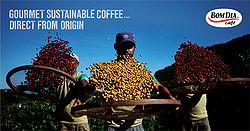
Café Bom Dia
Encyclopedia

Café Bom Dia' is a family-owned, integrated coffee producer rooted in four generations of growers. Today, the Marques de Paiva family sources beans from growers, and delivers coffee to customers throughout the world.
From tree to customer
In addition to cultivating coffee on Rainforest AllianceRainforest Alliance
The Rainforest Alliance is a non-governmental organization with the published aims of working to conserve biodiversity and ensure sustainable livelihoods by transforming land-use practices, business practices and consumer behavior. It is based in New York City, and has offices throughout the...
certified family farms, Café Bom Dia sources beans from its network of Fair Trade
Fair trade
Fair trade is an organized social movement and market-based approach that aims to help producers in developing countries make better trading conditions and promote sustainability. The movement advocates the payment of a higher price to producers as well as higher social and environmental standards...
, Rainforest Alliance
Rainforest Alliance
The Rainforest Alliance is a non-governmental organization with the published aims of working to conserve biodiversity and ensure sustainable livelihoods by transforming land-use practices, business practices and consumer behavior. It is based in New York City, and has offices throughout the...
, and Organic Certified farmers, as well as conventional farmer partners.
Growers
Growers include more than 4,800 Fair Trade
Fair trade
Fair trade is an organized social movement and market-based approach that aims to help producers in developing countries make better trading conditions and promote sustainability. The movement advocates the payment of a higher price to producers as well as higher social and environmental standards...
, Rainforest Alliance
Rainforest Alliance
The Rainforest Alliance is a non-governmental organization with the published aims of working to conserve biodiversity and ensure sustainable livelihoods by transforming land-use practices, business practices and consumer behavior. It is based in New York City, and has offices throughout the...
and Organic
Organic certification
Organic certification is a certification process for producers of organic food and other organic agricultural products. In general, any business directly involved in food production can be certified, including seed suppliers, farmers, [food] processors, retailers and restaurants.Requirements vary...
Certified and conventional farmer partners in Brazil
Brazil
Brazil , officially the Federative Republic of Brazil , is the largest country in South America. It is the world's fifth largest country, both by geographical area and by population with over 192 million people...
, Colombia
Colombia
Colombia, officially the Republic of Colombia , is a unitary constitutional republic comprising thirty-two departments. The country is located in northwestern South America, bordered to the east by Venezuela and Brazil; to the south by Ecuador and Peru; to the north by the Caribbean Sea; to the...
, Costa Rica
Costa Rica
Costa Rica , officially the Republic of Costa Rica is a multilingual, multiethnic and multicultural country in Central America, bordered by Nicaragua to the north, Panama to the southeast, the Pacific Ocean to the west and the Caribbean Sea to the east....
, Ethiopia
Ethiopia
Ethiopia , officially known as the Federal Democratic Republic of Ethiopia, is a country located in the Horn of Africa. It is the second-most populous nation in Africa, with over 82 million inhabitants, and the tenth-largest by area, occupying 1,100,000 km2...
and Sumatra
Sumatra
Sumatra is an island in western Indonesia, westernmost of the Sunda Islands. It is the largest island entirely in Indonesia , and the sixth largest island in the world at 473,481 km2 with a population of 50,365,538...
.
Roasters
Nearly 80 percent of our coffee is roasted at a 'CarbonNeutral' facility in Minas Gerais
Minas Gerais
Minas Gerais is one of the 26 states of Brazil, of which it is the second most populous, the third richest, and the fourth largest in area. Minas Gerais is the Brazilian state with the largest number of Presidents of Brazil, the current one, Dilma Rousseff, being one of them. The capital is the...
, the heart of Brazil's coffee country. Partner roasting facilities are located in Colombia
Colombia
Colombia, officially the Republic of Colombia , is a unitary constitutional republic comprising thirty-two departments. The country is located in northwestern South America, bordered to the east by Venezuela and Brazil; to the south by Ecuador and Peru; to the north by the Caribbean Sea; to the...
and Seattle, Washington.
Sustainable Certifications
Through internationally recognized certifications, third-party organizations guarantee that Café Bom Dia and its network of coffee growers abide by the strictest standards for environmental and social practices.
- Fair Trade = Fair Trade certification guarantees fair prices, direct trade, environmental sustainability and community development for small-scale, family farmers.
- Organic = Organic certification assures that the coffee is grown without the use of pesticides or chemicals, and that the water supply, soil and wildlife habitats are protected and conserved.
- Rainforest Alliance = Rainforest Alliance certification guarantees that the coffee farm meets strict standards on conserving biodiversity and ensuring sustainable livelihoods for employees.
- CarbonNeutral = In 2007 and 2008, Café Bom Dia reduced and offset its CO2 emissions to net zero in accordance with The CarbonNeutral Protocol.
Using renewable sources of energy
In 2007, Café Bom Dia converted its roasting furnaces to run on environmentally-friendly, renewable resources instead of fossil fuels.Cafe Bom Dia was able to achieve this by implementing a program to obtain sustainably forested eucalyptus wood and by using coffee tree trimmings as sources of fuel for its furnaces.
- 141 gallons of diesel saved per 1,000 pounds of roasted coffee (1,180 L/t)
- 36,630 pound (16.61 t) decrease of CO2 emissions in first year of conversion
- 74% energy costs saved per 1,000 pounds of coffee
- 14.8 pounds of organic material provided to local farmers for compost per 1,000 pounds of roasted coffee (14.8 kg/Mg)
- 100% decrease in sulfur dioxide (SO2) emissions in first year of conversion (from 154,000 ppm in 2006 to 0 in 2007)
- 50% decrease in particulates emissions in first year of conversion (from 410,000 ppm in 2006 to 213,000 ppm in 2007)

